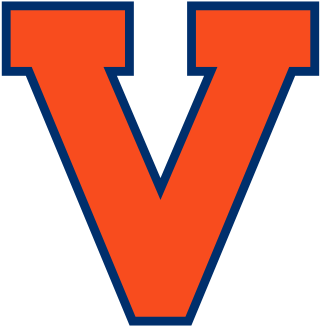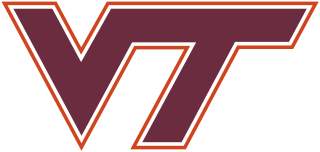"Old Hokie" is a spirited cheer, often used by fans of Virginia Tech's athletic teams. It was coined by Oscar M. Stull in a winning student body contest entry to mark the changing of the university's name from Virginia Agricultural and Mechanical College (VAMC) to Virginia Polytechnic Institute and Agricultural and Mechanical College (VPI) in 1896. According to Stull, "Hokie" is a nonsensical word he made up purely as an attention-getter.

The Virginia–Virginia Tech football rivalry is an American college football rivalry between the Virginia Cavaliers football team of the University of Virginia and Virginia Tech Hokies football team of Virginia Polytechnic Institute and State University. The two schools first met in 1895 and have played annually since 1970. The game counts for 1 point in the Commonwealth Clash each year, and is part of the greater Virginia–Virginia Tech rivalry.

Lane Stadium is a college football stadium in the eastern United States, located on the campus of Virginia Polytechnic Institute and State University in Blacksburg, Virginia. The playing surface of the stadium is named Worsham Field. The home field of the Virginia Tech Hokies of the Atlantic Coast Conference (ACC), it was rated the number one home field advantage in all of college football in 2005 by Rivals.com. In 2007, it was ranked #2 on ESPN.com's "Top 10 Scariest Places To Play." The stadium is named for Edward Hudson Lane, a former student, local businessman, and Virginia Tech booster, while the playing surface is named for Wes Worsham, a university donor and booster.

The Virginia Tech Hokies are the athletic teams representing Virginia Tech in intercollegiate athletics. The Hokies participate in the NCAA's Division I Atlantic Coast Conference in 22 varsity sports. Virginia Tech's men's sports are football, basketball, baseball, cross country, golf, soccer, swimming and diving, tennis, indoor and outdoor track and field, and wrestling. Virginia Tech's women's sports are basketball, cross country, lacrosse, soccer, softball, swimming and diving, tennis, indoor and outdoor track and field, golf, and volleyball.

English Field at Atlantic Union Bank Park is a baseball stadium in Blacksburg, Virginia. It is the home field of the Virginia Tech Hokies college baseball team. It was opened in 1989 and has a capacity of 1,033 in chair back seats plus additional grass-covered bank seating along the left field line known as "The Hill". English Field underwent an $20 million renovation in 2018.
Tech Talk Live is a weekly radio show, hosted by Hokies play-by-play announcer Bill Roth, dedicated to discussion of Virginia Tech Hokies football and men's basketball. The show airs every Monday night at 7pm during the school year.
The 1947 Sun Bowl was a post-season American college football bowl game between the VPI Gobblers of the Southern Conference (SoCon) and the independent Cincinnati Bearcats. It took place on January 1, 1947, at Kidd Field in El Paso, Texas. Cincinnati won, 18–6, in cold and icy conditions that led to a scoreless first half and three blocked extra points by VPI. The game was the first NCAA-sanctioned post-season football contest for Cincinnati, and was the first bowl game in VPI history. The 1947 game was also the 13th edition of the Sun Bowl, which had been played every year since 1935. In exchange for their participation in the event, each team received $9,438.

The Virginia Tech Hokies football team represents Virginia Polytechnic Institute and State University in the sport of American football. The Hokies compete in the Football Bowl Subdivision (FBS) of the National Collegiate Athletic Association (NCAA) and the Coastal Division of the Atlantic Coast Conference. They previously competed in the Big East. Their home games are played at Lane Stadium, located in Blacksburg, Virginia, with a seating capacity of over 65,000 fans. Lane Stadium is considered to be one of the loudest stadiums in the country, being voted number two in ESPN's 2007 "Top 20 Scariest Places to Play". It was also recognized in 2005 by Rivals.com as having the best home-field advantage in the country.

The 1966 Liberty Bowl was a post-season American college football bowl game between the VPI Gobblers and the Miami Hurricanes, both independent programs. The eighth edition of the Liberty Bowl, it was played on December 10, 1966, at Memphis Memorial Stadium in Memphis, Tennessee. The game was the final contest of the 1966 NCAA University Division football season for both teams, and ended in a 14–7 victory for Miami. A then-record 39,101 tickets were sold for the game, but due to 36 °F (2 °C) temperatures at game time, only 25,012 spectators attended.

The 1968 Liberty Bowl was an American college football postseason bowl game between the VPI Gobblers and the Ole Miss Rebels of the University of Mississippi. The 10th edition of the Liberty Bowl, it was played at Memphis Memorial Stadium in Memphis, Tennessee, on December 14, 1968. The game was the final contest of the 1968 NCAA University Division football season for both teams, and ended in a 34–17 victory for Mississippi.
The 1918 VPI Gobblers football team represented Virginia Polytechnic Institute, now known as Virginia Tech, in the 1918 college football season. The 1918 team went 7–0 and claims a South Atlantic Intercollegiate Athletic Association (SAIAA) championship. It is the only team in school history that finished the season with a perfect record.
The 1963 VPI Gobblers football team represented the Virginia Polytechnic Institute in the 1963 NCAA University Division football season. It was the only Southern Conference football championship Tech won during its tenure in the leage, 1921-1965.
The 1936 VPI Gobblers football team represented Virginia Agricultural and Mechanical College and Polytechnic Institute, now known as Virginia Tech, in the 1936 college football season. The team was led by their head coach Henry Redd and finished with a record of five wins and five losses (5–5). It finished with a 3–5 record in the Southern Conference. The Gobblers were shut out in all five of the games they lost. The team was 3-0 on its home field, Miles Stadium. It won three of its last four games, finishing the year beating arch-rival Virginia 7–6 at home, and winning the annual Thanksgiving Day contest against VMI at Maher Field in Roanoke.
The 1946 VPI Gobblers football team was an American football team that represented Virginia Polytechnic Institute as a member of the Southern Conference (SoCon) during the 1946 college football season. In their second year under head coach Jimmy Kitts, the Gobblers compiled a 3–4–3 record, lost to Cincinnati in the 1947 Sun Bowl, and were outscored by a total of 149 to 102.
The 1964 VPI Gobblers football team represented the Virginia Polytechnic Institute or VPI as a member of the Southern Conference (SoCon) during the 1964 NCAA University Division football season. Led by fourth-year head coach Jerry Claiborne the Gobblers compiled an overall record of 6–4 with a mark of 3–1 in conference play, and finished second in the SoCon. VPI played home games at Miles Stadium in Blacksburg, Virginia.
The 1956 VPI Gobblers football team represented the Virginia Polytechnic Institute or VPI as a member of the Southern Conference (SoCon) during the 1956 NCAA University Division football season. Led by sixth-year head coach Frank Moseley the Gobblers compiled an overall record of 7–2–1 with a mark of 3–0 in conference play, and finished second in the SoCon. VPI played home games at Miles Stadium in Blacksburg, Virginia.

The 1954 VPI Gobblers football team represented Virginia Polytechnic Institute, now known as Virginia Tech, in the 1954 college football season. The team, coached by Frank Moseley, had an 8–0-1 record. The team was ranked 16th in the final Associated Press poll. Three major college football teams had perfect records in 1954, but the Gobblers only prevailed over one team with a winning record, fellow Southern Conference member Richmond, which was 5–4.

The 1976 Virginia Tech Gobblers football team was an American football team that represented Virginia Tech as an independent during the 1976 NCAA Division I football season. In their third year under head coach Jimmy Sharpe, the Gobblers compiled an overall record of 6–5.

"Skipper" is the name of the Virginia Tech Corps of Cadets' cannon that is sounded at home football games and other events. The game cannon was created by a group of cadets in 1963 for Virginia Tech football games and special events.











